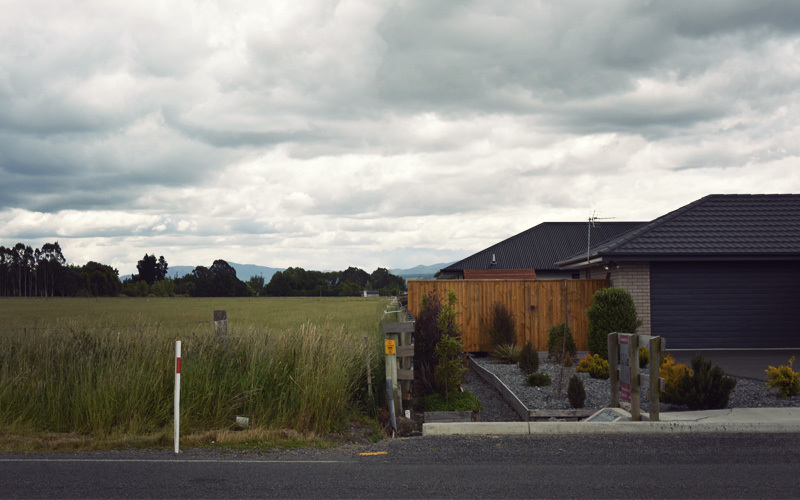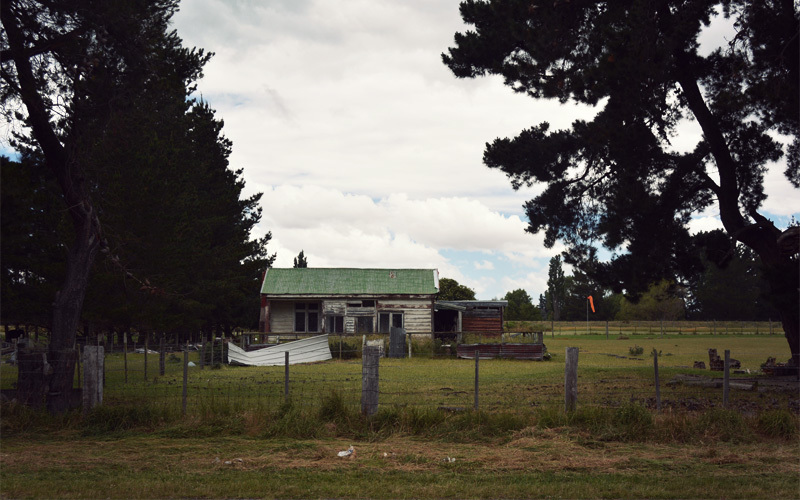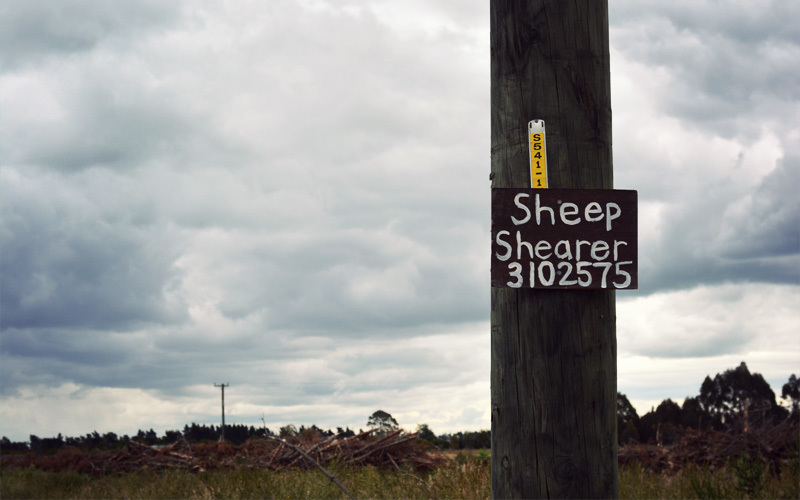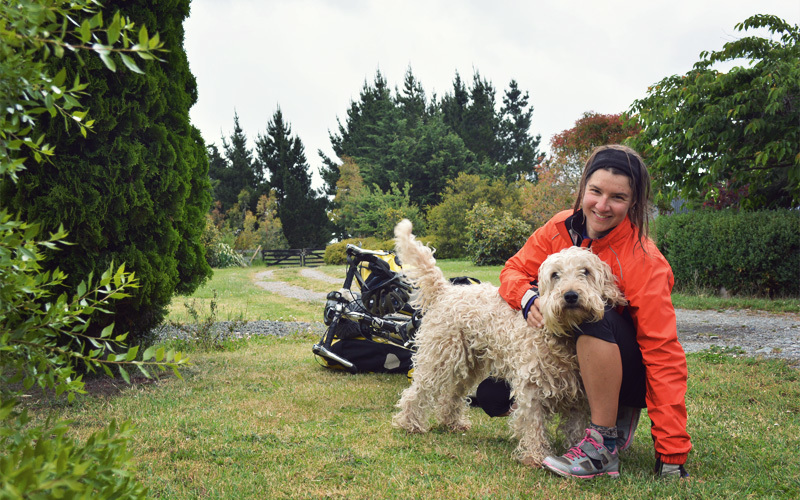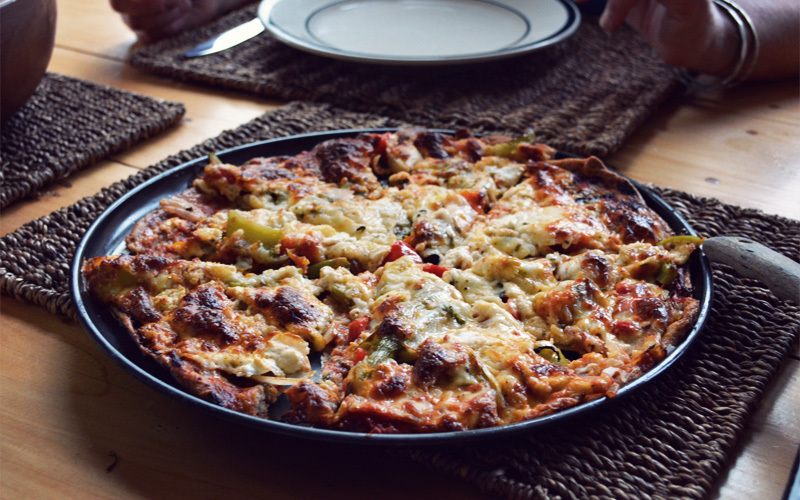December 1, 2014
Day 97: Woodend Beach to near Rangiora, NZ
We would have been waiting a long time at the McDonald's if we'd refused to ride in the rain yesterday. It keeps up all evening, all night, and all the way into the morning, which greets us with a world wet enough and cold enough that we stay buried deep inside the sleeping bag in our secluded corner of the forest until long after the rest of New Zealand has come alive.
The pounding hooves of five or six horses pulling chariots piloted by retired drivers shake the ground alongside the trail as we push the bikes out of the woods and the underbrush and retrace our path back to the highway. Our gears and chains and brakes grind and hiss with the grit of left-behind trail dirt as we make our way toward Rangiora on a road heavy with Monday traffic. The road takes us past horse pastures, small farms, and modest homes that all have their garbage cans sitting out front in the gravel next to the pavement. If the Christchurch area keeps expanding outward, and the small but growing towns out here continue to do the same, it's the sort of countryside that forty or fifty years from now will be covered in an unbroken mass of tract houses, grocery stores, and strip malls. The agriculture operates at a small enough scale that by then the land itself will hold greater value than what it's capable of producing.

| Heart | 0 | Comment | 0 | Link |
After inadvertently swearing at high volume in front of an eighty-year-old woman as I load up my panniers with chocolate bars and cookies, we prepare to leave town and head toward the small goat farm where we'll be volunteering. Standing in front of the grocery store, out of the wind and in the sun, the day feels warm enough that I almost start to sweat because I'm wearing my rain jacket. But three minutes later when we're a few blocks down the road, the clouds have blocked out the sun and the day has turned so cold that I have to stop to zip my jacket all the way up and put on gloves. A few miles farther on rain starts to fall, light at first but soon in a downpour. It's the first day of December, exactly three weeks from the start of summer here, and yet we feel like we're riding through the middle of what could pass for a mild winter's day almost anywhere in the United States.
The rain begins to let up as we head down a long gravel driveway and arrive at the home of Sarah and Steve and their daughter Clementine, with whom we'll be staying for the next week. As soon as we've transferred the gear from our bikes to our bedroom, we set out for a walk around the twenty-acre property with Sarah. We first meet the cattle, including Lucy, the pregnant, friendly, curious Jersey cow, who follows so closely behind us as we walk through the paddocks that at several points I feel the press of a giant wet nose on my back. Along the way we find out that in addition to taking care of the goats and helping out with all sorts of smaller tasks around the farm, we'll also take part in exciting things like helping hold down a three-week-old goat while someone else uses their hand to rip off one of the testicles.
Then it's on to meet the main herd of goats, which includes about a dozen females and five or six of their kids. Almost without exception they are animals that are interested, inquisitive, unafraid, and who love being scratched on the head and rubbed on the neck just like dogs. Every time I look away at something on the other side of the paddock, a moment later I feel one of their noses brush up against my leg or try to pry open the flaps of my shorts pocket to find out what might be kept inside. The farm work starts straight off, with Kristen and I working together to put food in buckets for the goats, replace their day-old water with fresh water, and help unload heavy barrels of barley mash that came from a brewery in Christchurch and that later in the week will become food for both the goats and the cows. It's new and unfamiliar stuff. It's so different from riding bikes. And it means that we'll be learning new things every day, which makes it interesting by default.
The family comes together over pizza and salad, where the vegetables have been fresh-picked from the sprawling garden that sits just beyond the sliding glass doors, the salami comes from animals raised in the paddocks through which we just walked, and the cheese is made from the milk of the goats that we just fed. We learn that Sarah and Steve spent several years living and working abroad in places as different as France and the Ivory Coast before emigrating to New Zealand from the U.K. twelve years ago. Since then they've found great joy and satisfaction and fulfillment in running a small farm, raising their children, and working toward self-sufficiency. The three of them are thoughtful, welcoming, and generous, but the thing that stands out above all else is how thankful and appreciative they are for what they have. The family speaks highly and often of the idea of gratitude. At one point Clementine talks about how she doesn't want to celebrate Christmas, but rather something like the holiday of American Thanksgiving, because it's about recognizing what you already have, rather than wanting and buying and consuming what you don't. That would be an uncommon sentiment from most adults, let alone a fifteen-year-old, but in this family it seems to fit.
As we get ready for bed in our upstairs room, Kristen and I both agree that we've lucked out again. We've ended up in another volunteering situation with a kind and interesting family, where the work ahead of us looks varied, satisfying, and capable pushing us beyond the limits of what we know and what we've done before. And then, with the weight of six weeks of South Island cycling bearing down on us, she clicks off the bedside lamp and we fall right to sleep.
Today's ride: 18 miles (29 km)
Total: 3,200 miles (5,150 km)
| Rate this entry's writing | Heart | 2 |
| Comment on this entry | Comment | 0 |
